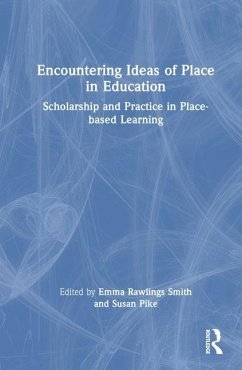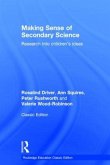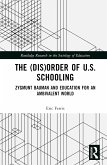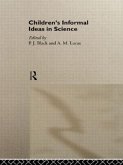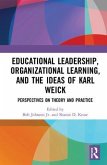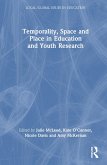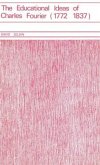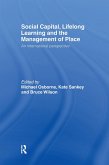Encountering Ideas of Place in Education
Scholarship and Practice in Place-based Learning
Herausgeber: Rawlings Smith, Emma; Pike, Susan
Encountering Ideas of Place in Education
Scholarship and Practice in Place-based Learning
Herausgeber: Rawlings Smith, Emma; Pike, Susan
- Gebundenes Buch
- Merkliste
- Auf die Merkliste
- Bewerten Bewerten
- Teilen
- Produkt teilen
- Produkterinnerung
- Produkterinnerung
This book draws together theories, research, and practice on knowledges and pedagogies of place across educational settings.
Andere Kunden interessierten sich auch für
![Making Sense of Secondary Science Making Sense of Secondary Science]() Rosalind DriverMaking Sense of Secondary Science238,99 €
Rosalind DriverMaking Sense of Secondary Science238,99 €![The (Dis)Order of U.S. Schooling The (Dis)Order of U.S. Schooling]() Eric FerrisThe (Dis)Order of U.S. Schooling204,99 €
Eric FerrisThe (Dis)Order of U.S. Schooling204,99 €![Children's Informal Ideas in Science Children's Informal Ideas in Science]() P. J. Black (ed.)Children's Informal Ideas in Science283,99 €
P. J. Black (ed.)Children's Informal Ideas in Science283,99 €![Educational Leadership, Organizational Learning, and the Ideas of Karl Weick Educational Leadership, Organizational Learning, and the Ideas of Karl Weick]() Educational Leadership, Organizational Learning, and the Ideas of Karl Weick204,99 €
Educational Leadership, Organizational Learning, and the Ideas of Karl Weick204,99 €![Temporality, Space and Place in Education and Youth Research Temporality, Space and Place in Education and Youth Research]() Temporality, Space and Place in Education and Youth Research204,99 €
Temporality, Space and Place in Education and Youth Research204,99 €![Educational Ideas of Charles Fourier 1772-1837 Educational Ideas of Charles Fourier 1772-1837]() David ZeldinEducational Ideas of Charles Fourier 1772-1837215,99 €
David ZeldinEducational Ideas of Charles Fourier 1772-1837215,99 €![Social Capital, Lifelong Learning and the Management of Place Social Capital, Lifelong Learning and the Management of Place]() Mike Osborne / Kate Sankey / Bruce Wilson (eds.)Social Capital, Lifelong Learning and the Management of Place272,99 €
Mike Osborne / Kate Sankey / Bruce Wilson (eds.)Social Capital, Lifelong Learning and the Management of Place272,99 €-
-
-
This book draws together theories, research, and practice on knowledges and pedagogies of place across educational settings.
Hinweis: Dieser Artikel kann nur an eine deutsche Lieferadresse ausgeliefert werden.
Hinweis: Dieser Artikel kann nur an eine deutsche Lieferadresse ausgeliefert werden.
Produktdetails
- Produktdetails
- Verlag: Routledge
- Seitenzahl: 310
- Erscheinungstermin: 1. Dezember 2023
- Englisch
- Abmessung: 240mm x 161mm x 21mm
- Gewicht: 631g
- ISBN-13: 9781032478241
- ISBN-10: 1032478241
- Artikelnr.: 68714320
- Herstellerkennzeichnung
- Libri GmbH
- Europaallee 1
- 36244 Bad Hersfeld
- gpsr@libri.de
- Verlag: Routledge
- Seitenzahl: 310
- Erscheinungstermin: 1. Dezember 2023
- Englisch
- Abmessung: 240mm x 161mm x 21mm
- Gewicht: 631g
- ISBN-13: 9781032478241
- ISBN-10: 1032478241
- Artikelnr.: 68714320
- Herstellerkennzeichnung
- Libri GmbH
- Europaallee 1
- 36244 Bad Hersfeld
- gpsr@libri.de
Emma Rawlings Smith is Lecturer in Sustainability and Geography Education at the University of Southampton, England. Susan Pike is Assistant Professor of Geography Education, Trinity College Dublin, Ireland.
PART 1: BEING IN PLACE 1. Bee-ing and Feeling of Place 2. Encountering the
Riverina: Developing inter-cultural capabilities in Indigenous science
environmental education 3. Reframing children's disempowered relationships
with once-familiar places through Eco-Capabilities 4. Encountering the
Everyday: Place writing during geography fieldwork 5. Place-based learning
initiatives in the Burrenbeo 6. A place-based pedagogy for outdoor
education PART 2: COMMUNITY PLACES, PERSPECTIVES AND EXPERIENCES 7.
Documenting young children's perspectives of their locality through their
multi-modal representations of space 8. Mapping the importance of place,
identity and local ways of knowing 9. Place-based education: Fostering
local identities among Thailand's youth 10. Young people's musings on
community at a community radio station 11. Place-based education:
Understanding and investigating the important questions 12. Possibilities
of a radical pedagogy of place: Lessons from Haocha 13. Developing a
virtual sense of place PART 3: ENCOUNTERING PLACE IN EDUCATIONAL SPACES
14. Home, place and young people's geographies in the classroom 15.
Fostering the Traveller child's sense of place in education 16.
Interrupting the everyday: Students' photography in reimagining their
places 17. Diversity, demographics and sense of place: English as an
Additional Language pupils' school experiences 18. Difference and
diversity: teaching climate change through an attention to place 19.
Exploring the geographical palimpsest of place through local and
international fieldwork 20. Conclusion
Riverina: Developing inter-cultural capabilities in Indigenous science
environmental education 3. Reframing children's disempowered relationships
with once-familiar places through Eco-Capabilities 4. Encountering the
Everyday: Place writing during geography fieldwork 5. Place-based learning
initiatives in the Burrenbeo 6. A place-based pedagogy for outdoor
education PART 2: COMMUNITY PLACES, PERSPECTIVES AND EXPERIENCES 7.
Documenting young children's perspectives of their locality through their
multi-modal representations of space 8. Mapping the importance of place,
identity and local ways of knowing 9. Place-based education: Fostering
local identities among Thailand's youth 10. Young people's musings on
community at a community radio station 11. Place-based education:
Understanding and investigating the important questions 12. Possibilities
of a radical pedagogy of place: Lessons from Haocha 13. Developing a
virtual sense of place PART 3: ENCOUNTERING PLACE IN EDUCATIONAL SPACES
14. Home, place and young people's geographies in the classroom 15.
Fostering the Traveller child's sense of place in education 16.
Interrupting the everyday: Students' photography in reimagining their
places 17. Diversity, demographics and sense of place: English as an
Additional Language pupils' school experiences 18. Difference and
diversity: teaching climate change through an attention to place 19.
Exploring the geographical palimpsest of place through local and
international fieldwork 20. Conclusion
PART 1: BEING IN PLACE 1. Bee-ing and Feeling of Place 2. Encountering the
Riverina: Developing inter-cultural capabilities in Indigenous science
environmental education 3. Reframing children's disempowered relationships
with once-familiar places through Eco-Capabilities 4. Encountering the
Everyday: Place writing during geography fieldwork 5. Place-based learning
initiatives in the Burrenbeo 6. A place-based pedagogy for outdoor
education PART 2: COMMUNITY PLACES, PERSPECTIVES AND EXPERIENCES 7.
Documenting young children's perspectives of their locality through their
multi-modal representations of space 8. Mapping the importance of place,
identity and local ways of knowing 9. Place-based education: Fostering
local identities among Thailand's youth 10. Young people's musings on
community at a community radio station 11. Place-based education:
Understanding and investigating the important questions 12. Possibilities
of a radical pedagogy of place: Lessons from Haocha 13. Developing a
virtual sense of place PART 3: ENCOUNTERING PLACE IN EDUCATIONAL SPACES
14. Home, place and young people's geographies in the classroom 15.
Fostering the Traveller child's sense of place in education 16.
Interrupting the everyday: Students' photography in reimagining their
places 17. Diversity, demographics and sense of place: English as an
Additional Language pupils' school experiences 18. Difference and
diversity: teaching climate change through an attention to place 19.
Exploring the geographical palimpsest of place through local and
international fieldwork 20. Conclusion
Riverina: Developing inter-cultural capabilities in Indigenous science
environmental education 3. Reframing children's disempowered relationships
with once-familiar places through Eco-Capabilities 4. Encountering the
Everyday: Place writing during geography fieldwork 5. Place-based learning
initiatives in the Burrenbeo 6. A place-based pedagogy for outdoor
education PART 2: COMMUNITY PLACES, PERSPECTIVES AND EXPERIENCES 7.
Documenting young children's perspectives of their locality through their
multi-modal representations of space 8. Mapping the importance of place,
identity and local ways of knowing 9. Place-based education: Fostering
local identities among Thailand's youth 10. Young people's musings on
community at a community radio station 11. Place-based education:
Understanding and investigating the important questions 12. Possibilities
of a radical pedagogy of place: Lessons from Haocha 13. Developing a
virtual sense of place PART 3: ENCOUNTERING PLACE IN EDUCATIONAL SPACES
14. Home, place and young people's geographies in the classroom 15.
Fostering the Traveller child's sense of place in education 16.
Interrupting the everyday: Students' photography in reimagining their
places 17. Diversity, demographics and sense of place: English as an
Additional Language pupils' school experiences 18. Difference and
diversity: teaching climate change through an attention to place 19.
Exploring the geographical palimpsest of place through local and
international fieldwork 20. Conclusion

